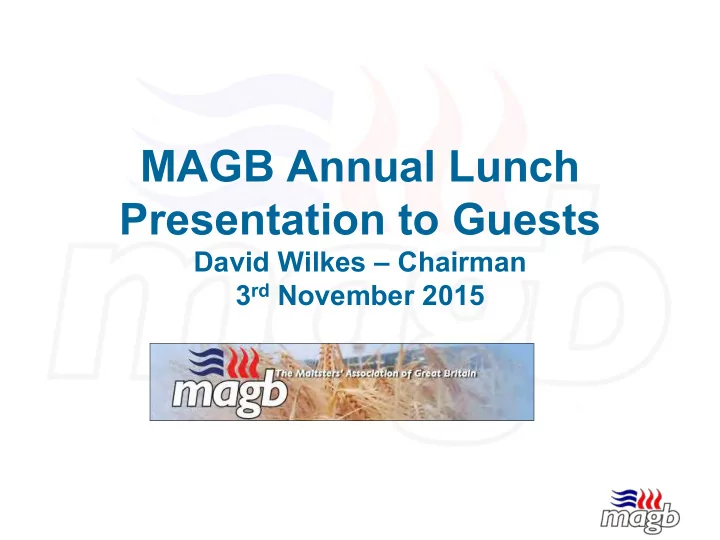

MAGB Annual Lunch Presentation to Guests David Wilkes – Chairman 3 rd November 2015
Last year we announced an intended change in Luncheon format • In 2014 we undertook a review of MAGB activities: Re-confirmed the scope and detail of the key areas of focus for the Association Decided to consider a change to the annual lunch • We originally considered relocating the lunch outside London to be held in the summer to include “field” activities but decided London was more convenient for guests • We did however decide to change the format: Have introduced pre-lunch presentations for guests Have extended the invite list to include: Association guests Individual member guests associated with the supply chain • Your post-event feedback would be appreciated
The MAGB represents 98% of UK malting industry participants • Todays membership represents more than 98% of the UK malting industry, which buys around 2 million tonnes of choice UK malting barley, to make about 1.6 million tonnes of malt. • The MAGB's mission statement is: To promote and safeguard the UK malting industry, so enabling it to fulfil its world-wide potential. • The MAGB's aims and objectives are: To promote the understanding of the industry's requirements for raw materials, to ensure their quality and sufficiency of supply To monitor and interpret legislation affecting the industry, and make the appropriate representations. To promote and assure the safety and wholesomeness of malt. To continually improve the competitiveness of the UK malting industry To identify and promote the beneficial application of technology To promote standards of excellence within the industry through training, examinations and best industry practice.
The MAGB functions through a series of committees supported by the secretariat Executive Committee Technical Trade MAGB (CCL) Committee Committee Examinations Health and Committee Safety Forum
The MAGB engages with numerous key stakeholders throughout the supply chain
The UK is the 5 th largest producer of malt globally Russia Canada USA Spain China India Kenya Brazil Australia South Africa Argentina
The UK has global, national and speciality malting industry players - Warminster - Thomas Fawcett - Edwin Tucker - French & Jupps - Diageo - Highland Distillers
The UK is a significant producer of quality malting barley in a global context
UK maltsters have a range of markets Brewing The UK is the 8 th largest beer producer in the world.
UK maltsters have a range of markets Distilling Scotch Whisky exports were Exports were worth valued at £3.95 billion in 2014. £3.95bn in 2014. The Industry remains one of the UK’s top exporting sectors. The equivalent of USA remains the largest 1.19bn bottles were market by value with shipped worldwide. exports worth £750m . Single Malt is growing in Around 31% of the popularity in many value of exports are to markets. EU countries.
UK maltsters have a range of markets Exports Russia Canada Kazakhstan USA China India Mexico Brazil Angola Value Of UK Malt Export Key By Country In 2014 Australia N/A £0-£1.8 Millon £1.8 - £3.6 Million Chile £3.6-£7.1 Million >£7.1 million
The distribution between these markets has changed over time
Training and development is an important focus for the Association • Fundamentals in Malting (FiM) A workbook based programme, guided by a mentor • General Certificate in Malting (GCM) An exam run jointly with the IBD. Candidates from many countries • Certificate in Malting Competence (CMC) On completing FiM and GCM, UK candidates are awarded CMC • Diploma in Malting A qualification being developed jointly by MAGB and Anticipated to be of interest internationally • Malting Diploma Achieved by passing three written papers which test practical knowledge and integrated experience • Master Maltster Awarded to candidates who have passed the three papers of the Malting Diploma, a written project, an integrated case study paper and an oral exam. The highest level qualification in malting management
The following are some of the key areas of focus in the last year • We have completed a review of Association activities • Food safety remains an important area of collaboration: We have collaborated in our sector food safety due diligence exercise We have been proactive in collecting data on mycotoxins T-2 and HT-2, together with other UK cereal sectors, and getting those submitted to EFSA. The UK was the only member state to submit data for 2014 Again, we have submitted data proactively on amines of ergot in barley to assist development of an evidence base on which to found future regulation We have joined the TASCC working group of AIC to help to establish even better food safety continuity in our supply chain • We have participated in the pilot project for Egrain passport.
The following are some of the key areas of focus in the last year • We have exceeded our target for energy savings in the sector CCA by a carbon dioxide emissions equivalent in excess of 15000 tonnes • We have participated in Euromalt activities such as carbon calculator development, HACCP protocol review, BREF review • We work closely with our customers to develop new varieties of barley that suit the grower, with one new winter variety and one new spring variety becoming fully approved for brewing this year • We have worked closely with SWRI to assess the method of analysis of phenols in malt • We have supported the funding application to establish an International Barley Hub at JHI, and continue to support the concept after the application has not succeeded for that specific funding
There have been some key secretariat changes this year Jennie Richards retired in August, but has agreed to continue to administer training and examinations. Tracy Lawton joined the Sue Capewell MAGB in September to continues to assume Jennies other support the responsibilities. association. Colin West intends to retire at the end of 2015 and his successor will be announced in due course.
Recommend
More recommend